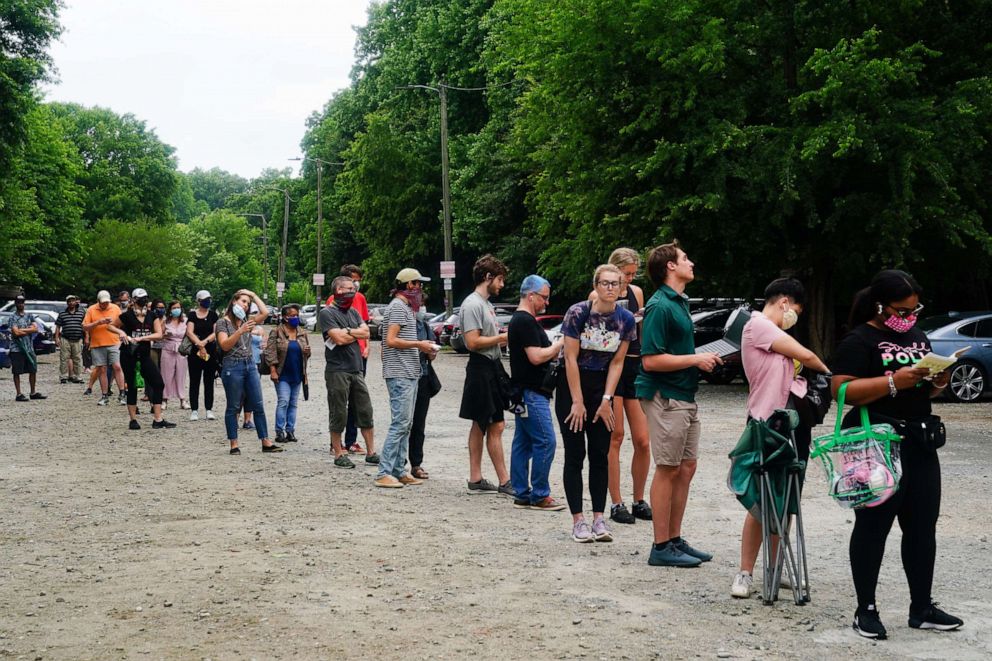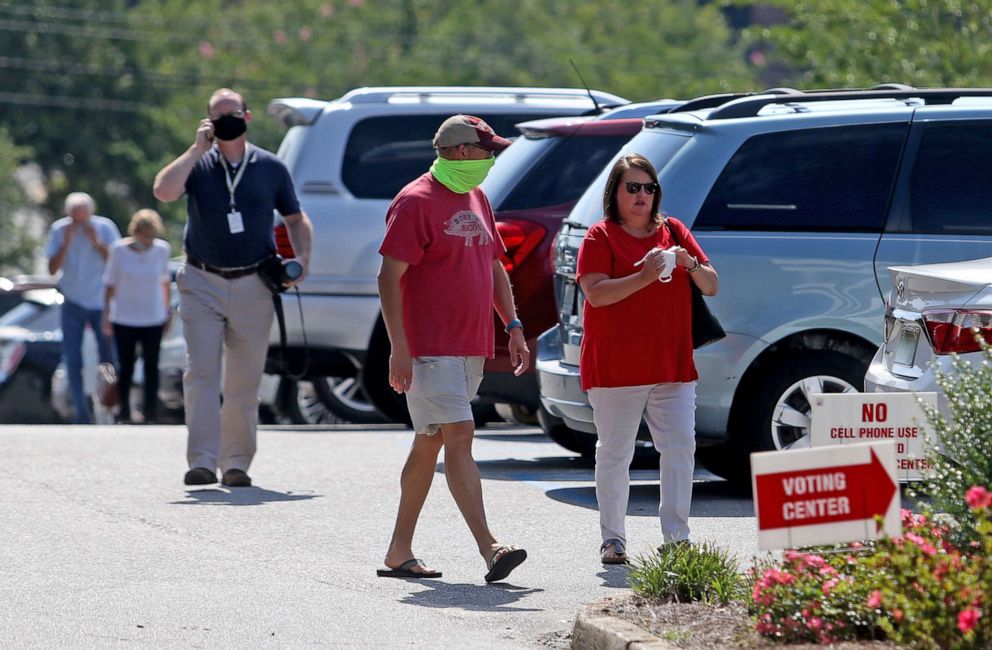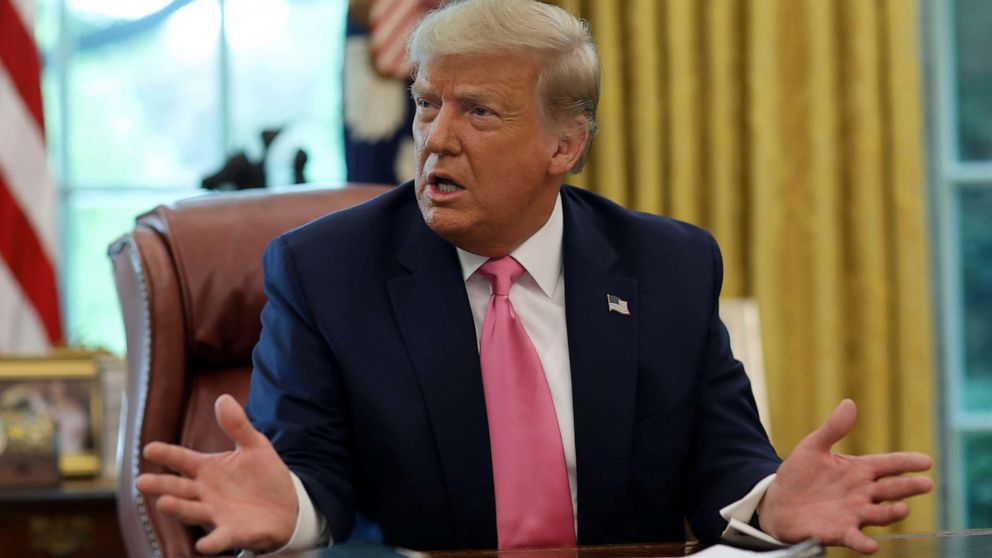'I don't trust it': Is Trump's false rhetoric on vote-by-mail resonating?
President Donald Trump's crusade against vote-by-mail, laced with false criticisms of the primary alternative amid the coronavirus pandemic, appears to be resonating with some voters across the country, as nearly half of Americans (49%) are convinced mail-in voting is susceptible to significant fraud.
The plurality of respondents from a new ABC News/Washington Post poll who believe that the risks of vote-by-mail outweigh the benefits -- even as a raging pandemic challenges every aspect of conducting an election -- signals broad mistrust in the electoral process, less than four months ahead of the consequential November election.
Overall, a majority (59%) favor in-person voting, while over a third of Americans (38%) said their preference is to vote-by-mail. In the last presidential election, 24% of voters casted ballots by mail in 2016, according to the U.S. Election Assistance Commission.
On the question about the perils of mail-in ballots, compared to the near majority who said this form of voting is vulnerable to fraud, 43% of Americans in the new survey said there are adequate safeguards in place to thwart fraud with voting by mail.
Since the onset of the coronavirus crisis -- which has seen a resurgence of cases in recent weeks across the Sun Belt and the West -- the president has escalated his attacks on vote-by-mail, seeking to discredit the integrity of the option, which a number of states have turned to due to fears of contracting the virus that has hamstrung in-person voting.
"I think mail-in voting is going to rig the election, I really do," Trump said in an interview with "Fox News Sunday," without offering evidence and before refusing to commit to accepting the results of the general election. His latest remark follows months of baseless claims on the voting tactic, such as, "I think it's subject to tremendous fraud," "With mail-in ballots, people can forge 'em" and "Mail-in voting... will lead to the most corrupt election in USA history."

Election experts have rebuffed Trump's allegations, saying that there is no widespread fraud in mail-in voting.
While vote-by-mail presents potential risks that are different from in-person voting, "mail ballot fraud is incredibly rare, and legitimate security concerns can be easily addressed," according to the Brennan Center for Justice at New York University School of Law, a non-partisan law and policy think tank.
But in a series of follow-up interviews with respondents, ABC News learned that still, some voters aren't convinced.
"It's happening now... Republicans' votes are getting lost or they're not getting counted or people that are deceased are magically voting," Matthew Fick, a former Marine and voter in Pennsylvania who plans to vote for Trump in the fall, said in a follow-up interview with ABC News. Fick's own reticence to use mail-in ballots was partly influenced by the news, he said, and by Trump's message on vote-by-mail.
"I don't trust it. I really just don't trust it," he continued. "If you send a bill out in the mail, sometimes it gets lost... I would much rather do [it] in person."
Fick isn't the only one.
"I understand what he's saying," Janet Reid, of North Carolina, said of Trump's statements about mail-in voting in an interview. "I just feel more comfortable if everybody presents themselves voting versus voting by mail."
"A lot of times, even the mail today, we get another person's mail," she continued. "How easy would it be for someone to get my mail and respond to it for me. That's where I feel like fraud would come in... how would I prove that it was not me?"
Reid has been a victim of fraud herself, she said, as someone once used her license illegally. "I'm just true to my core that I feel like you need to be present in voting... it really means a lot to me to vote," she added.
Some voters told ABC News that their aversion to vote-by-mail stems from recent primaries, during which states grappling with the coronavirus quickly adjusted their election blueprints and expanded mail-in voting in an effort to protect public health.
Amy Rapp, a Republican voter in Montana, told ABC News that in addition to feeling that voting in-person is instrumental to democracy -- and that vote-by-mail pales in comparison to the act of going to a polling place and casting a ballot -- she's also worried about ballots not arriving to voters in time.
Her chief concerns are "things being lost in the mail, not getting to voters in time or [not] getting back to the poll in time," she said.
Election fiascos in Wisconsin and Georgia, where both states dramatically and hastily expanded absentee voting to adapt to the coronavirus pandemic, led to voters not receiving ballots on time and experiencing long lines at polling locations due to ballot delays.
The rapid switch from predominantly in-person elections to those conducted primarily by mail makes it increasingly difficult for election workers and the postal service to handle the influx of absentee ballots.
Rapp said after reading reports of voters receiving their ballots late, or of ballots that were returned through the mail and did not make it back to election officials in time to be counted for Montana's all-mail primary on June 2, she grew concerned about the efficiency of the process.
"I delivered mine personally to the election officials," she said. "Here in Montana, it takes a while for mail to get places. We're a spread out place and we have small post offices. People had to vote so early to make sure that we're going to get [ballots] in and then we're going to drop it off."
She doesn't think federal funding is the answer, though, and she believes it should be up to individual states to decide if absentee voting should be expanded.
"It really needs to be handled at a local level, is my opinion on the matter, and that's where we have some gray area," Rapp said. "And I think having the precedent set that we want the federal government to step in anytime the state is doing something that we don't like, instead of taking care of it at the state level on our own, sets the precedent that the federal government can come in and do whatever they want."
Registered voters who support Trump are nearly six times more likely to opt for in-person voting over vote-by-mail, according to the new poll, while among backers of former Vice President Joe Biden, a majority (55%) prefer to head to a polling site, compared to 42% who said they would pick mail-in ballots.
While some of the respondents are influenced by Trump's efforts to cast the process as ripe for fraud, others' distrust in the system comes from deeply-rooted beliefs that predate the Trump administration.
"All voting is vulnerable to fraud," said Brandon Combs, a voter in Ohio who may vote for Biden. Combs said that he "of course" feels safer voting in-person, even though the coronavirus outbreak has made it "more complicated."
"There's more hesitation at this point," Combs, who said he is not swayed by Trump, continued. "People say a lot of different things... everybody needs to educate themselves."
Some in the pro-Biden flank are more open to the vote-by-mail experience during the pandemic, but they're still concerned over what they perceive as its vulnerabilities.
Dennis Bagent, a Biden supporter and part-time nurse in Ohio, said he supports voting by mail for those who cannot make it to the polls. He said that while he can get out of the house to cast his ballot, he knows there are others who can't.
"I agree with it, because there are people who cannot make it to the polls. We live in a senior housing complex, and a lot of the people here don't go out a whole lot, especially during this time. My wife and I both continue to work part-time," he said. "So, it would be nothing for us to go to the polls. So voting by mail for the people who cannot go to the polls is a good idea."
Another likely Biden supporter, Gerardo Barbosa, who resides in Florida -- a perennial swing state -- alleged that committing fraud with vote-by-mail is "easier to do than people think."
"It's not totally, 100% foolproof," he said. "I've felt like this a long time ago."
"I was born and raised in Puerto Rico," Barbosa said of the island that has a history of political corruption -- where the current governor is the target of an ongoing probe and the previous governor resigned amid intense pressure from protesters and politicians. "I believe it because of all the times that I went through it."

But in states like Florida, despite some voters' reservations and the president's war against mail-in ballots, state Republicans are contradicting Trump, encouraging GOP voters to cast mail-in ballots.
The state GOP, seeking to boost turnout, mailed out fliers to voters in Florida -- where voters don't require an excuse to request or cast ballots by mail -- urging them to register for absentee ballots. But in an extraordinary step, the party used a doctored tweet by Trump to convince voters to use the alternative, by highlighting only part of what the president wrote. "Absentee ballots are fine. A person has to go through a process to get and use them," the tweet read.
The flier blurred out the rest, which read: "Mail-In Voting, on the other hand, will lead to the most corrupt Election is USA history. Bad things happen with Mail-Ins. Just look at Special Election in Patterson, N.J. 19% of Ballots a FRAUD!"
The push came as Florida Republicans trail their Democratic counterparts in registering voters for absentee voting, with Democrats holding a 423,000 enrollment edge over the GOP, according to state Democrats.
Trump's opposition to vote-by-mail could ultimately stifle participation among Republicans, but his rhetoric on the issue, some experts fear, could also more broadly harm the democratic process.
"The question is public confidence in the system, and if people don't have public confidence in the system, then that's a real problem -- even if, in fact, there wouldn't be much fraud under the system," Mark Scarberry, a professor of law at Pepperdine University and an election law expert, told ABC News in May. "[It] is critical that people have that sort of confidence, especially when the president is making the kind of statements he's making about huge amounts of fraud. And people will listen to that."
Despite the ongoing debate over mail-in ballots, some voters, like Combs, believe that just getting out the vote is paramount.
"We should definitely take advantage of the opportunity to vote," he said. "I think it would be good for everyone to just get out and vote, period, no matter how it's done."




